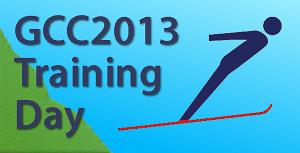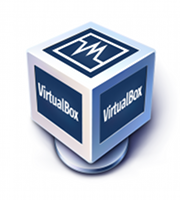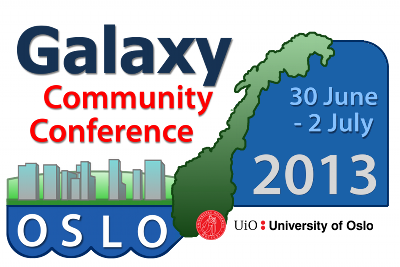
The 2013 Galaxy Community Conference (GCC2013) will start on 30 June with a Training Day featuring fourfive parallel tracks, each with three workshops, each of which are two hours long, for a total of twelvefifteen sessions on twelve different topics. Sessions are evenly split between topics aimed at biological research, topics aimed at Galaxy deployers and developers, and those that are geared twoards both audiences. The topics were nominated and selected by the Galaxy Community in early 2013. The increased number of parallel tracks and topics was driven by unexpected demand.
Workshops will be hands-on and participants will be strongly encouraged to bring a laptop and follow along.
Registration
You register for the Training Day (and specify which sessions you will attend) when you register for the conference. You can register for the Training Day and the main meeting, or just the Training Day.
Training Day registration is 55% off if you register for both.
Schedule
| Time | CAML Rm 3348 | C Rm 3347 | Logo Rm 2438 | Python Rm 2269 | Prolog Rm 2465 |
|---|---|---|---|---|---|
| 8:00 | Registration Opens and Catered Breakfast | ||||
| 9:00 | Galaxy Code and Storage Architecture | Statistical Genome Analysis with Galaxy | Installing and Maintaining a Local Galaxy Server | Introduction to Galaxy and the Galaxy Ecosystem | Running Galaxy on the Cloud |
| 11:00 | Catered Lunch | ||||
| 12:30 | The Galaxy API | Introduction to Tool and Data Source Configuration | RNA-Seq Analysis with Galaxy | Statistical Genome Analysis with Galaxy | Running Galaxy on the Cloud |
| 14:30 | Break | ||||
| 15:00 | Advanced Tool and Data Source Configuration | Galaxy Tool Shed | Variant and SNP Analysis with Galaxy | RNA-Seq Analysis with Galaxy | ChIP-Seq Analysis with Galaxy |
| 17:00 | Finish | ||||
| Key: | General | Biologist centric | Developer & Deployer centric | ||
Prerequisites and Technology
Each topics lists prerequisites, both for what you should know, hardware, and software.
Hardware
In almost every workshop participants will need a wifi-enabled laptop.
Software
In general:
All Workshops: Require a web browser such as Chrome, Firefox, or Safari. The latest version of Internet Explorer should also work.
Galaxy Deployment and Development Workshops: Require virtual machine (VM) player software on your laptop, either VirtualBox, or VMware player. See the Training Day VMs page for more. This should be installed before you arrive at the conference.
See each individual workshop's list of prerequisite for specifics.
Topics
General Workshops
Introduction to Galaxy and the Galaxy Ecosystem
| Instructors | Anton Nekrutenko, Penn State University Jennifer Hillman-Jackson, Penn State University | |
|---|---|---|
| Content | New to Galaxy? This will introduce you to the Galaxy Project, the Galaxy Community, and walk you through a simple use case demonstrating what Galaxy can do. |  This workshop uses [AWS](http://aws.amazon.com/)-based compute infrastructure |
| Prerequisites | * A modern web browser. Google Chrome, Firefox and Safari will work best. * Little or no knowledge of Galaxy. | |
| Outcomes | You'll know what Galaxy can do, the basics of how to use it, and have an understanding of the project. | |
| Links | Slides | |
Running Galaxy on the Cloud
| Instructors | Enis Afgan, Ruđer Bošković Institute (RBI) Dannon Baker, Emory University | |
|---|---|---|
| Content | Want the power of Galaxy without the compute infrastructure overhead? Need to run compute-intensive analysis, but only from time to time? Learn how to set up your own elastic, and fully populated (tools and reference data) Galaxy instance using Amazon Web Services. You'll also learn to customize and share your galaxy cloud instance with others. |  This workshop uses [AWS](http://aws.amazon.com/)-based compute infrastructure |
| Prerequisites | * A modern web browser. Google Chrome, Firefox and Safari will work best. * Knowledge and comfort with the Unix/Linux command line interface and a text editor. If you don't know what cd, mv, rm, mkdir, chmod, grep and so on can do then you will struggle in this workshop. * Knowledge of a simple Text Editor (`vi, pico, nano`). | |
| Outcomes | You will have created a Galaxy server on Amazon Web Services using CloudMan. | |
| Links | Slides | |
Biologist Centric Workshops
RNA-Seq Analysis with Galaxy
| Instructors | Jeroen F.J. Laros, LUMC Wibowo Arindrarto, LUMC Leon Mei, NBIC/LUMC | |
|---|---|---|
| Content | This hands-on workshop will demonstrate basic RNA-Seq analysis pipelines including quality control, alignment (e.g. Tophat (Bowtie), GSNAP), transcript assembly (Cufflinks), exon and transcript quantification, and differential expression analysis in Galaxy. Sample datasets small enough to be successfully processed during the course of the seminar will be provided. Participants will perform the analyses themselves on the provided cloud instance of Galaxy. |  This workshop uses [AWS](http://aws.amazon.com/)-based compute infrastructure |
| Prerequisites | * A modern web browser. Google Chrome, Firefox and Safari will work best. * A general knowledge of Galaxy, or attendance at the "[Introduction to Galaxy and the Galaxy Ecosystem](/events/gcc2013/training-day/#introduction-to-galaxy-and-the-galaxy-ecosystem)" session. | |
| Outcomes | 1. *Reads to Results* analysis of transcript level differences between two conditions 1. Visualization of the results in Galaxy’s Trackster | |
| Links | Slides, Handouts | |
Statistical Genome Analysis with Galaxy
| Instructors | Geir Kjetil Sandve, University of Oslo Sveinung Gundersen, University of Oslo |
|---|---|
| Content | The session will cover how to formulate precise hypothesis tests regarding e.g. co-localization or proximity between genomic features, through a simple web interface (the Galaxy-based Genomic HyperBrowser). The session will be driven by examples on genomic regions representing transcription factor binding, epigenetic modifications and association to disease, as e.g. produced by the ENCODE and Roadmap Epigenomics projects. The importance of precisely formulated hypotheses and biologically realistic null models will also be discussed. |
| Prerequisites | * A modern web browser. Google Chrome, Firefox and Safari will work best. * A general knowledge of Galaxy, or attendance at the "[Introduction to Galaxy and the Galaxy Ecosystem](/events/gcc2013/training-day/#introduction-to-galaxy-and-the-galaxy-ecosystem)" session. |
| Outcomes | You will know how to easily perform genome-scale testing of precise hypotheses involving genomic features/tracks, and know why it is still tricky to get it right. |
| Links | Slides |
ChIP-Seq Analysis with Galaxy
| Instructors | Alban Lermine, Institut Curie Valentina Boeva, Institut Curie |
|---|---|
| Content | This hands-on workshop will demonstrate basic ChIP-Seq data analysis. Starting from peak calling and Chromatin immunoprecipitation quality control, participants will assess the identification of transcription factors binding sites as well as histone modifications. Sample datasets small enough to be successfully processed during the course of the seminar will be provided. Participants will perform the analyses themselves on the provided instance of Galaxy. |
| Prerequisites | * A modern web browser. Google Chrome, Firefox and Safari will work best. * A general knowledge of Galaxy, or attendance at the "[Introduction to Galaxy and the Galaxy Ecosystem](/events/gcc2013/training-day/#introduction-to-galaxy-and-the-galaxy-ecosystem)" session. |
| Outcomes | 1. Quality control of the ChIP experiment 1. Peak calling and annotation 1. Identification of transcription factors binding sites 1. Identification of histone modification |
| Links | Tutorial |
Variant and SNP Analysis with Galaxy
| Instructors | Erik Garrison, Boston College Anton Nekrutenko, Penn State University | |
|---|---|---|
| Content | Participants in this workshop will use simulation to develop familiarity with the performance of basic SNP and indel detection methods. By comparing variant detection results under different conditions to the known set of true variants produced by the simulation, participants will assess the effects of standard practices such as base quality recalibration, indel realignment, and variant quality filters. |  This workshop uses [AWS](http://aws.amazon.com/)-based compute infrastructure |
| Prerequisites | * A modern web browser. Google Chrome, Firefox and Safari will work best. * A general knowledge of Galaxy, or attendance at the "[Introduction to Galaxy and the Galaxy Ecosystem](/events/gcc2013/training-day/#introduction-to-galaxy-and-the-galaxy-ecosystem)" session. | |
| Outcomes | You will be able to use simulation to determine optimal small variant detection methods and selection criteria for a given experimental design. | |
| Links | Slides | |
Galaxy Deployment and Development Workshops
Installing and Maintaining a Local Galaxy Server
| Instructors | George Magklaras, Biotechnology Center of Oslo & Norwegian Center for Molecular Medicine, University of Oslo Katerina Michalickova, University Center for Information Technology (USIT), University of Oslo Nikolay Vazov, University Center for Information Technology (USIT), University of Oslo | |
|---|---|---|
| Content | Learn how to install your own copy of Galaxy locally. Participants will install Galaxy on a virtual machine image provided at the workshop. Different aspects of the administration of a running Galaxy instance. How to monitor tool usage and user quota. How to make good use of groups. How to safely upgrade your Galaxy, and the tools it uses. | |
| Prerequisites | * A modern web browser. Google Chrome, Firefox and Safari will work best. * [Virtual machine (VM) player software](/events/gcc2013/training-day/vms/), either [VirtualBox](http://virtualbox.org) or [VMware Player](https://my.vmware.com/web/vmware/free#desktop_end_user_computing/vmware_player/). * The [virtual machine image](/events/gcc2013/training-day/vms/#2-download-needed-vms-on-your-laptop) (download from [Norway](ftp://ftp.no.embnet.org/galaxy/images/BasicWorkshop.ova) or [US](http://depot.galaxyproject.org/BasicWorkshop.ova)) for this workshop. * A general knowledge of Galaxy, or attendance at the "[Introduction to Galaxy and the Galaxy Ecosystem](/events/gcc2013/training-day/#introduction-to-galaxy-and-the-galaxy-ecosystem)" session. * Knowledge and comfort with the Unix/Linux command line interface and a text editor. If you don't know what cd, mv, rm, mkdir, chmod, grep and so on can do then you will struggle in this workshop. * Basic Linux package management administration (yum / apt-get) * Basic [PostgreSQL](http://postgresql.org) database setup skills * Knowledge of a simple Text Editor (`vi, pico, nano`). |  This workshop will require that you have the [VirtualBox](http://virtualbox.org) player (or [VMware](http://vnware.com) player) installed on your laptop. |
| Outcomes | You will have installed and configured a running Galaxy instance under Linux. | |
| Links | Slides | |
Introduction to Tool and Data Source Configuration
| Instructors | Dan Blankenberg, Penn State University Ross Lazarus, BakerIDI | |
|---|---|---|
| Content | Learn to integrate new tools and data sources into your Galaxy installation. | |
| Prerequisites | * A modern web browser. Google Chrome, Firefox and Safari will work best. * [Virtual machine (VM) player software](/events/gcc2013/training-day/vms/), either [VirtualBox](http://virtualbox.org) or [VMware Player](https://my.vmware.com/web/vmware/free#desktop_end_user_computing/vmware_player/). * The [virtual machine image](/events/gcc2013/training-day/vms/#2-download-needed-vms-on-your-laptop) (download from [US](http://depot.galaxyproject.org/GCC2013-AdvWorkshops.ova)) for this workshop. * A general knowledge of Galaxy, or attendance at the "[Introduction to Galaxy and the Galaxy Ecosystem](/events/gcc2013/training-day/#introduction-to-galaxy-and-the-galaxy-ecosystem)" session. * Knowledge and comfort with the Unix/Linux command line interface and a text editor. If you don't know what cd, mv, rm, mkdir, chmod, grep and so on can do then you will struggle in this workshop. * Knowledge of a simple Text Editor (`vi, pico, nano`). * A "simple" executable tool you would like to wrap that takes and/or creates existing Galaxy datatypes like bed/fastq/bam etc such as one of the [bedTools executables](http://code.google.com/p/bedtools/). |  This workshop will require that you have the [VirtualBox](http://virtualbox.org) player (or [VMware](http://vnware.com) player) installed on your laptop. |
| Outcomes | You will have wrapped and installed tools and data sources in a Galaxy server, and be familiar with basic tool definition in Galaxy. | |
| Links | Workshop material | |
Advanced Tool and Data Source Configuration
| Instructors | Ross Lazarus, BakerIDI Dan Blankenberg, Penn State University | |
|---|---|---|
| Content | This topic would cover the advanced tool configuration, specifically designed for people that want to add their own tools or need to modify existing tools. Specific emphasis on using CHEETAH code and explanation of all the XML tags used in defining a tool | |
| Prerequisites | * A modern web browser. Google Chrome, Firefox and Safari will work best. * [Virtual machine (VM) player software](/events/gcc2013/training-day/vms/), either [VirtualBox](http://virtualbox.org) or [VMware Player](https://my.vmware.com/web/vmware/free#desktop_end_user_computing/vmware_player/). * The [virtual machine image](/events/gcc2013/training-day/vms/#2-download-needed-vms-on-your-laptop) (download from [US](http://depot.galaxyproject.org/GCC2013-AdvWorkshops.ova)) for this workshop. * Basic understanding of the process for developing a simple Galaxy tool as well as Galaxy data types, or attendance at [Introduction to Tool and Data Sources Configureation](/events/gcc2013/training-day/#introduction-to-tool-and-data-source-configuration). * Knowledge of a simple Text Editor (`vi, pico, nano`). * Knowledge and comfort with the Unix/Linux command line interface and a text editor. If you don't know what cd, mv, rm, mkdir, chmod, grep and so on can do then you will struggle in this workshop. |  This workshop will require that you have the [VirtualBox](http://virtualbox.org) player (or [VMware](http://vnware.com) player) installed on your laptop. |
| Outcomes | ||
| Outcomes | Workshop materials | |
Galaxy Tool Shed
| Instructors | Greg Von Kuster, Penn State University Dave Bouvier, Penn State University | |
|---|---|---|
| Content | The Galaxy Tool Shed is a place for the Galaxy community to share useful Galaxy utilities. Galaxy utilities are functionally correct Galaxy tools (including the new specialized Data Manager tools), custom Galaxy datatypes, 3rd-party tool dependency definitions, simple and complex repository dependency definitions and exported Galaxy workflows. All of these Galaxy utilities will be discussed in detail in this workshop. This workshop includes discussions about tool dependency and repository dependency definitions, but excludes discussions about developing new tools, custom datatypes or Galaxy workflows. | |
| Prerequisites | * A modern web browser. Google Chrome, Firefox and Safari will work best. * [Virtual machine (VM) player software](/events/gcc2013/training-day/vms/), either [VirtualBox](http://virtualbox.org) or [VMware Player](https://my.vmware.com/web/vmware/free#desktop_end_user_computing/vmware_player/). * The [virtual machine image](/events/gcc2013/training-day/vms/#2-download-needed-vms-on-your-laptop) (download from [US](http://depot.galaxyproject.org/GCC2013-AdvWorkshops.ova)) for this workshop. * A general knowledge of Galaxy, or attendance at the "[Introduction to Galaxy and the Galaxy Ecosystem](/events/gcc2013/training-day/#introduction-to-galaxy-and-the-galaxy-ecosystem)" session. * Knowledge and comfort with the Unix/Linux command line interface and a text editor. If you don't know what cd, mv, rm, mkdir, chmod, grep and so on can do then you will struggle in this workshop. * Basic understanding of the process for developing a simple Galaxy tool as well as Galaxy data types, or attendance at [Introduction to Tool and Data Sources Configureation](/events/gcc2013/training-day/#introduction-to-tool-and-data-source-configuration). |  This workshop will require that you have the [VirtualBox](http://virtualbox.org) player (or [VMware](http://vnware.com) player) installed on your laptop. |
| Outcomes | 1. Starting up your own local tool shed as well as your own local Galaxy instance. You will be interacting between these 2 applications throughout this workshop. 2. Creating new repositories in your tool shed, and uploading various Galaxy utilities to them. 3. Discovering how relationships are built between repositories and repository contents in the tool shed using tool dependency and simple and complex repository dependency definitions. 4. Installing repositories that contain each category of Galaxy utilities from the tool shed into your Galaxy instance and understanding the installation behavior of each of the utilities. 5. Deactivating and reactivating repositories installed into Galaxy and understanding the behavior of the various Galaxy utilities contained in the repositories. 6. Uninstalling and reinstalling repositories installed into Galaxy and understanding the behavior of the various Galaxy utilities contained in the repositories. 7. Building new Galaxy flavors using the tool shed. | |
| Links | Tool Shed Workshop slides Tool Shed Workshop recipe | |
The Galaxy API
| Instructors | Nate Coraor, Penn State University Carl Eberhard, Emory University | |
|---|---|---|
| Content | Learn the ins and outs of the Galaxy Applications Programming Interface (API). Examples of how to interact with multiple Galaxy resources and how to build a complex script from API building blocks. Details. | |
| Prerequisites | * A modern web browser. Google Chrome, Firefox and Safari will work best. * [Virtual machine (VM) player software](/events/gcc2013/training-day/vms/), either [VirtualBox](http://virtualbox.org) or [VMware Player](https://my.vmware.com/web/vmware/free#desktop_end_user_computing/vmware_player/). * The [virtual machine image](/events/gcc2013/training-day/vms/#2-download-needed-vms-on-your-laptop) (download from [US](http://depot.galaxyproject.org/GCC2013-AdvWorkshops.ova)) for this workshop. * A general knowledge of Galaxy, or attendance at the "[Introduction to Galaxy and the Galaxy Ecosystem](/events/gcc2013/training-day/#introduction-to-galaxy-and-the-galaxy-ecosystem)" session. * Knowledge and comfort with the Unix/Linux command line interface and a text editor. If you don't know what cd, mv, rm, mkdir, chmod, grep and so on can do then you will struggle in this workshop. * Knowledge of a programming or scripting language. |  This workshop will require that you have the [VirtualBox](http://virtualbox.org) player (or [VMware](http://vnware.com) player) installed on your laptop. |
| Outcomes | You will know how to interact with Galaxy through its API. | |
| Links | Workshop Materials | |
Galaxy Code and Storage Architecture
| Instructors | James Taylor, Emory University Nate Coraor, Penn State University |
|---|---|
| Content | This workshop will introduce participants to the high-level architecture of Galaxy internals, and to the project's coding practices and standards. Then, rather than try to cover all areas at a shallow depth, we will specifically focus on the implementations of workflows and the API. |
| Prerequisites | * A general knowledge of Galaxy, or attendance at the "[Introduction to Galaxy and the Galaxy Ecosystem](/events/gcc2013/training-day/#introduction-to-galaxy-and-the-galaxy-ecosystem)" session. * Knowledge of a programming or scripting language. |
| Outcomes | |
| Links | Slides Video (on YouTube as well), taken by Samuel Lampa, first 30 minutes only |
Training Day Sponsor
Amazon Web Services (AWS) is the official sponsor or the GCC2013 Training Day. Many of the workshops will use AWS-based Galaxy instances for hands-on training.
Nomination, Voting and Topic Selection
Topics were nominated and then voted on by the community. The Training Day schedule reflects community interest and has been structured so that as many people as possible can attend all the sessions they were interested in.
Thanks to everyone who participated in the nomination and voting process.
Software Carpentry Boot Camp
We are happy to announce that a Software Carpentry Boot Camp has been scheduled for 3-4 July (immediately following GCC2013), also at the University of Oslo. Software Carpentry Boot Camps are example-driven workshops on basic computing skills. Short tutorials alternate with hands-on practical exercises, and participants are encouraged both to help one another, and to try applying what they have learned to their own research problems during and between sessions.


